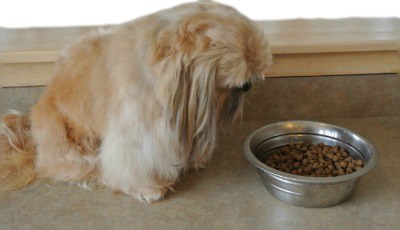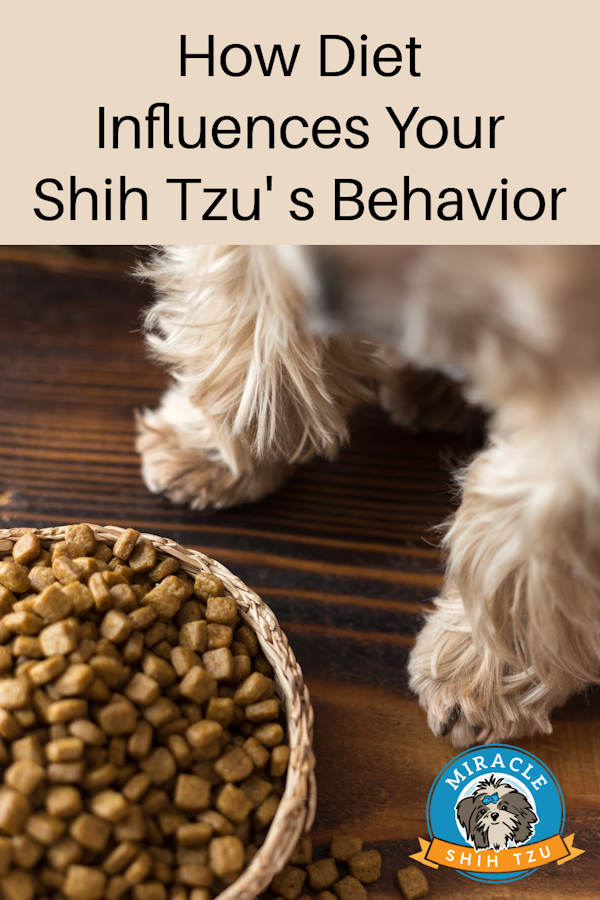How Diet Influences Your Shih Tzu’s Behavior and Mood
Shih Tzus are small dogs, but anyone who owns one knows of their big personality. These charming, affectionate little dogs often carry the strength of character and energy levels of much larger breeds. However, did you know that their behavior, mood, and overall demeanor are directly influenced by what they eat?
That’s right, the right diet can keep your Shih Tzu playful, calm, and happy, while a poor diet can lead to irritability, lethargy, or even behavioral issues. In this guide, we’ll explore how diet impacts Shih Tzu behavior and mood, and how you can use the power of nutrition to promote a balanced, joyful dog.

The Connection Between Diet and Dog Behavior
Just like humans, a Shih Tzu’s diet plays a crucial role in their mental and emotional state. The foods you feed your dog affect their overall health, energy levels, and even the way they interact with their environment. The gut, often referred to as “the second brain,” is home to a significant portion of the body’s neurotransmitters, including serotonin, which plays a key role in regulating mood and behavior.
When it comes to small breeds like Shih Tzus, their metabolism and nutritional needs are different from those of larger dogs. A balanced diet can help promote emotional stability and prevent mood swings or irritability. On the flip side, poor nutrition or an imbalanced diet can contribute to mood fluctuations, irritability, and even behavioral disorders.
How the Shih Tzu Diet Affects Behavior, Energy Levels, and Playfulness
 These three Shih Tzu dogs are calm and relaxed.
These three Shih Tzu dogs are calm and relaxed.Shih Tzus are known for their lively, playful personalities, but their small size means they have different energy requirements than larger dogs.
Feeding your dog high-quality, nutrient-dense food ensures they have the energy to be active and playful without becoming hyperactive or crashing after short bursts of activity. Foods that are rich in protein, such as chicken or fish, along with essential fatty acids, provide the energy Shih Tzus need to maintain their spunky, affectionate personalities.
Irritability and Anxiety
Just like humans, dogs can suffer from anxiety, and a poor diet can exacerbate this condition. A Shih Tzu with an imbalanced diet may exhibit signs of irritability, nervousness, or anxiety. This is often due to the lack of essential nutrients that help regulate neurotransmitter function.
For example, omega-3 fatty acids play a vital role in regulating mood and reducing inflammation in the brain. A lack of these crucial nutrients can lead to mood swings, stress, and anxiety, making your Shih Tzu more challenging to handle.
Calmness and Social Behavior
A proper diet can also contribute to a calm demeanor and more positive social behavior. Shih Tzus are naturally affectionate and sociable dogs, but when they don’t get the right food, they may become more withdrawn or display aggression or unwanted behaviors.
Breed-specific nutrition is crucial for maintaining the Shih Tzu’s unique temperament. Foods enriched with antioxidants, vitamins, and minerals help support brain function and neurotransmitter activity, ensuring your dog remains balanced and calm in social situations.
 Sometimes, Shih Tzu behavior problems present themselves in unusual ways.
Sometimes, Shih Tzu behavior problems present themselves in unusual ways.Best Food for Shih Tzus: What to Look For
When selecting food for your Shih Tzu, prioritize both quality and breed-specific nutrition. You can find top-notch supplements from reputable brands like Pup Labs to enhance your small dog’s diet and support their big personality. Here are some key components to look for in the best food for Shih Tzus:
High-Quality Protein
Protein is required for maintaining muscle mass and overall health. Look for dog food that includes high-quality sources of protein such as chicken, turkey, or fish. These proteins support physical health and contribute to your Shih Tzu’s energy levels and behavior.
Omega Fatty Acids
Omega-3 and omega-6 fatty acids play a crucial role in promoting brain health and regulating mood. Foods containing these fats help reduce inflammation in the brain and support cognitive function. Ingredients such as salmon, flaxseed, or fish oil are excellent sources of omega-3 fatty acids.
Probiotics and Prebiotics
As we mentioned earlier, the gut plays a massive role in a dog’s mood and behavior. Adding probiotics and prebiotics to your Shih Tzu’s diet can support a healthy gut microbiome, which in turn promotes mental well-being. Healthy digestion means a healthier, happier dog, with more stable moods.
Antioxidants and Vitamins
Antioxidants like vitamins E and C support your dog’s immune system and overall health. These nutrients help reduce stress and inflammation, contributing to a calm and well-adjusted dog. Additionally, they support your Shih Tzu’s skin and coat, helping them look and feel their best
Mood Swings in Small Dogs: The Role of Diet
It’s common for small dogs to experience mood swings due to their high energy levels and smaller body size. However, these mood swings are often exacerbated when the dog is not receiving the necessary nutrients. For example, low blood sugar, poor digestion, or an imbalance in gut bacteria can all contribute to irritability, restlessness, and anxiety in Shih Tzus.
One of the most effective ways to manage mood swings in small dogs is through a consistent, balanced diet. Regular meals that include complex carbohydrates can help stabilize blood sugar levels and prevent energy crashes that lead to irritability. Additionally, avoiding food with artificial additives or fillers can reduce inflammation in the body, which in turn minimizes mood swings and stress.
Healthy Dog Diet Tips for Shih Tzu

- Stick to a Consistent Feeding Schedule: Small dogs, such as Shih Tzu, benefit from regular meal times. Try to feed your dog at the same times each day to maintain stable blood sugar levels and avoid hunger-induced irritability.
- Portion Control is Key: Overfeeding can lead to obesity and behavioral issues. Ensure you're feeding your Shih Tzu the right portion size based on their age, weight, and activity level.
- Choose High-Quality Dog Food: Invest in dog food that’s free from artificial preservatives, fillers, and by-products. Look for ingredients that are high in protein and healthy fats to support mood regulation and overall health.
- Consider Supplements: If your dog has specific dietary needs, consider adding supplements to their diet, such as omega-3 fatty acids or probiotics, to support their overall well-being. These can support cognitive function, reduce anxiety, and improve overall mood.
Final Thoughts
Your Shih Tzu’s behavior and mood are a direct reflection of their overall health, and diet plays a significant role in their well-being. By choosing high-quality, breed-specific food that meets their nutritional needs, you can ensure your Shih Tzu remains happy, calm, and playful, ready to share their big personality with you.
How Diet Influences Your Shih Tzu's Diet: Pin for Future Reference
"Hi, I'm Janice Jones, a former veterinary technician and Shih Tzu expert with over 40 years of experience with the breed. Through Miracle Shih Tzu, I combine my medical background and extensive breed knowledge to provide reliable, practical advice for Shih Tzu owners. My mission is to help you give your Shih Tzu the happiest, healthiest life possible through evidence-based information and real-world solutions. Whether you're new to the breed or a seasoned owner, you'll find trusted guidance here for all aspects of Shih Tzu care.
I hold an undergraduate degree in Psychology with a minor in biology, Early Childhood Education, and Nursing, and a Master's in Mental Health Counseling.







